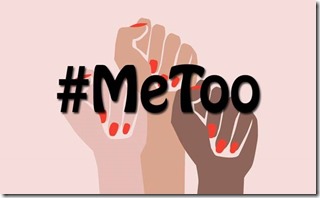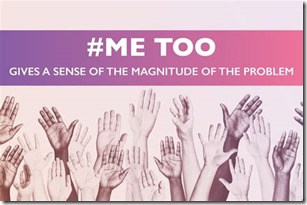Of course, I’m incredibly proud of the men and women stepping forward and saying #MeToo, calling attention to a problem that all too often flies under the radar and is not adequately dealt with. Over the course of this past year and a half, I’ve had friends, relatives, acquaintances come forward about their experiences with sexual assault and harassment, most of which I had no prior knowledge of. The premise of this movement—to demonstrate just how many people have suffered from some form of sexual assault or harassment—is a good one. But there’s a big flaw in its design.
Who should really be saying #MeToo?
The “me too” movement doesn’t define which people should be posting this message. And maybe this is purposeful. Maybe this is a good way to show that all ways of forcing sexual behaviors and experiences on people hurt. Each experience can be traumatizing, and no one person should feel that the trauma they’ve experienced should be invalidated because someone else has had it worse.
But… it makes the movement less resounding when you don’t know what people are really saying when they write #MeToo. Some of my fiends, one of them being 15, wrote #MeToo, and it absolutely terrified me to read that. I texted her to talk about it, and she informed me that a man had cat-called her while she walked to school. I’m not saying that’s okay, and I’m not saying that the majority of people posting this status don’t have traumatic experiences fueling their speech. But this is a problem with the narrative—we don’t know what people are identifying as sexual assault or harassment.
There are also a good number of men I’ve seen posting this status—some because of their own sexual harassment or assault, some because they’re standing in solidarity with the women that have been hurt and stating that in their message, and some also standing in solidarity, but writing nothing but the hashtag itself. It makes me wonder what I’m really seeing when someone posts this status. It started as a means to let the world see just how many people are hurt by sexual violence, but it’s become a term used too loosely to carry as much weight as it should be holding.
If someone has ever yelled out a suggestive comment that made me uncomfortable as I walked by, should I be posting #MeToo? If I have a relative that grabs my ass when I see him, should I be a part of this movement? If I’ve never been raped or sexually assaulted, should I still post the hashtag to stand in solidarity with those directly affected?
All unanswered questions, making a movement that should be meaningful, mostly confusing.
There’s an aspect of this movement that I absolutely love. People are talking. It’s removing the stigma that so many feel, opening up a widespread chance to have your story be heard. And you don’t need to stand alone when you tell it. Writing #MeToo is like holding hands with everyone else engaging in the movement, making victims feel less alone in the suffering that they’re probably kept to themselves for far too long.
So I don’t think this trend should stop by any means. If it’s getting people talking, it’s working, just not in the way that I think was originally intended. It’s no longer victims across Facebook, Twitter, and Instagram throwing up a red flag that says, “Look, I too have been hurt by sexual assault and harassment.” It’s a huge number of Internet users all saying, “Pay attention. Something is deeply wrong. We need to talk about it.”



This was a great read. I’m also glad there is attention brought to this movement, but with everything, there is always that fine line. To hear this opinion from a female perspective, I find it interesting.